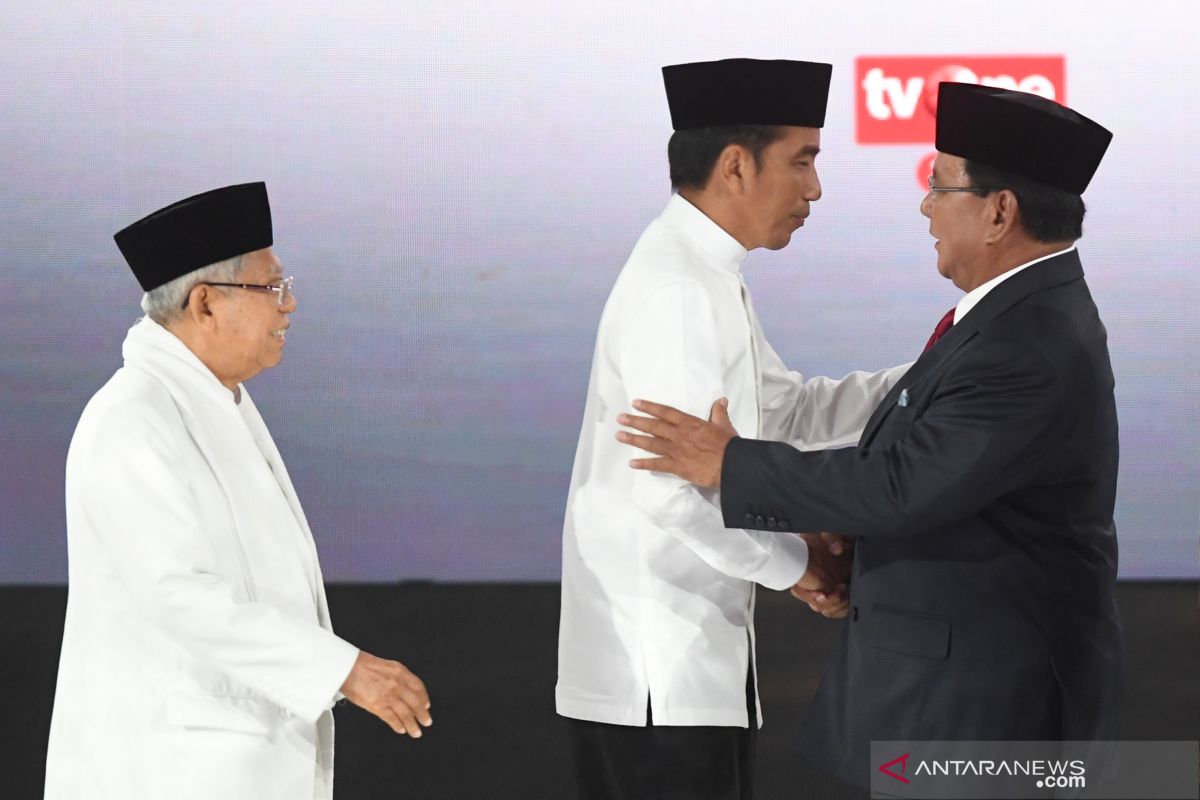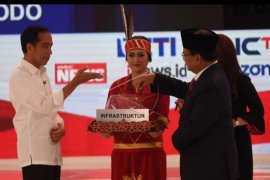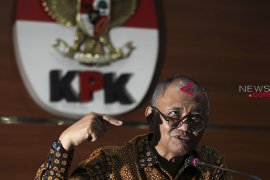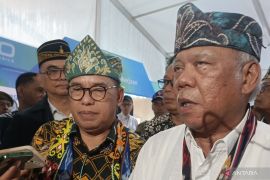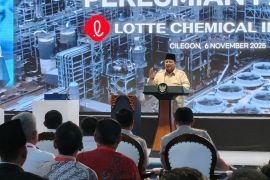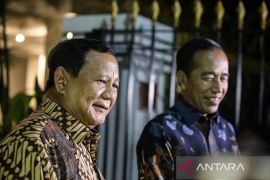The Presidential candidate number 01 Joko Widodo (Jokowi), when elaborating his economic strategy, expressed his commitment to continue to fight for the independence of the Indonesian economy as an effort to increase people's welfare.
"We want to fight for the independence of the Indonesian economy in an effort to increase people's welfare. Therefore, under my leadership for the past 4.5 years, we take over strategic resources that were previously controlled by foreigners. For example, Rokan Block, Mahakam Block, and Freeport," he said.
During his administration, incumbent President Joko Widodo and Vice President Jusuf Kalla have been fighting hard to restore the original character of Indonesian development, which was not just based on the economic growth but more on economic equality.
Without economic equality, Jokowi noted that there will be inequality among regions that cause injustice.
"We build infrastructures not only on Java Island but also on islands outside Java, in an attempt to build new economic centers outside Java through Special Economic Zones, Tourism Industries, and other industries," he remarked.
Regarding social welfare, Jokowi has prepared three card programs to promote the social welfare of Indonesians. The three cards include the Indonesia Smart Card (KIP), Pre-Employment Card and Affordable Staple Foods Card.
“In terms of social welfare, we have the Indonesia Smart Card (KIP). We hope all children, especially those from poor families, can have access to higher education with this card,” said Jokowi.
He said that the Pre-Employment Card will be issued so that the government can organize training, both inside and outside the country for high school graduates and those who have been dismissed from their workplace (PHK).
“There will also be the Affordable Staple Foods Card that will allow women to buy staple foods at discounted prices, as we will be subsidizing some of them,” he said.
Previously, Jokowi said that the three cards will be distributed to the deserving members of the public next year and will become effective soon after the distribution.
He also vowed to stop trade deficit by implementing policies to boost exports and reduce imports.
"In future, I am sure trade deficit will disappear, and the key is by developing and down-streaming industry. That's the key," Jokowi said.
The incumbent presidential candidate said trade balance posted a deficit in 2018. However, he added, the trade balance improved in the first quarter of 2019, thanks to reform of policies in the fields of export and domestic industrialization.
The Indonesian Government has boosted the development of oil refineries to increase oil production, he noted, adding that it was because oil and gas imports in 2018 contributed to the trade deficit.
"Our trade deficit is some eight billion US dollars. To reduce oil and gas imports, we will build oil refineries," the presidential candidate said.
Meanwhile, the presidential candidate number 02 Prabowo Subianto and his running mate Sandiaga Uno stated that boosting the industry and maintaining certainty in business are important to strengthen Indonesia’s agriculture and fishery sectors.
Subianto, who first spoke during the second segment of the debate, stated that he would downstream the industrial sector by processing raw materials into end products. He noted that the Indonesian government under Jokowi had focused only on building infrastructure, and as a result, the country's industry was lagging.
Subianto, during his campaign in Surabaya, East Java, on April 12, promised his supporters that he would raise the country’s economic growth to reach “double digits”. Under Jokowi’s administration, Indonesia’s growth has lagged by five percent, he said.
Apart from the stagnant economy, Subianto was also vocal over the country’s debt that has increased by 69 percent to Rp4,418.3 trillion in 2018. However, the government, under the incumbent president's ruling, revealed that Indonesia’s debt ratio to GDP was relatively healthy at 29.89 percent last year.
Subianto said Indonesia has moved towards a wrong direction because the foundation for building the nation has deviated from its goals as stipulated in the 1945 Constitution.
"We let our wealth be taken out of Indonesia. More wealth of our citizens are preserved abroad," he said.
In addition to the outflow of the Indonesian citizens' wealth, Indonesia has also been undergoing de-industrialization. Due to this de-industrialization, the country has not produced "anything". Instead, it imports products of other countries to meet the people's demands.
"This is wrong, and the Prabowo-Sandi pair is offering a change," he added.
He also strongly criticized the Jokowi administration's frequent imports of basic commodities saying that the policy has made Indonesian farmers suffer. Speaking at the final presidential debate here on Saturday evening, Subianto also criticized the Jokowi leadership which has emphasized on the construction of infrastructure sector.
He argued that toll roads and other infrastructure facilities that the government has been building were used to create smooth flows of imported goods into Indonesia's domestic market instead of boosting Indonesia's exported products.
In term of poverty eradication, he has said the Indonesian government could take an example from China in poverty eradication efforts, to deal with the problem which is still existing in this country.
"We have taken a wrong way. The People's Republic of China within 40 years has managed to eradicate poverty. We must follow this example. Dare to learn from an advanced nation," Subianto said.
He opined that Indonesia's economy has gone toward a wrong direction, hence it needs a reorientation of development strategy.
For the final presidential debate, the General Elections Commission (KPU) had appointed on 10 panelists in charge of conjuring up and preparing questions on the issues to be debated by the duo pairs.
The panelists' team comprises economists from various universities and organizations chosen by the KPU, namely Muhammad Nasi, the Airlangga University rector; Eddy Suratman from the University of Tanjungpura; Muhammad Arief Mufraini from the Syarif Hidayatullah Islamic State University; and Suhartono from Diponegoro University.
Other eminent members of the panel feature Herman Karamoy from Sam Ratulangi University; I Nyoman Mahaendra Yasa from Udayana University; Harif Amali Riva'i from Andalas University; Dermawan Wibisono from Bandung Institute of Technology; Tukiman Taruno Sayoga from Soegijapranata Catholic University; and Rahmi Hertanti, the executive director of Indonesia Global Justice (IGJ).
Related news: State-owned enterprises' super holding necessary: Jokowi
Related news: Jokowi claims government responds quickly to development of e-sport
Related news: Infrastructure development outside Java to create equitability: Jokowi
Editor: Azizah Fitriyanti
Copyright © ANTARA 2019
